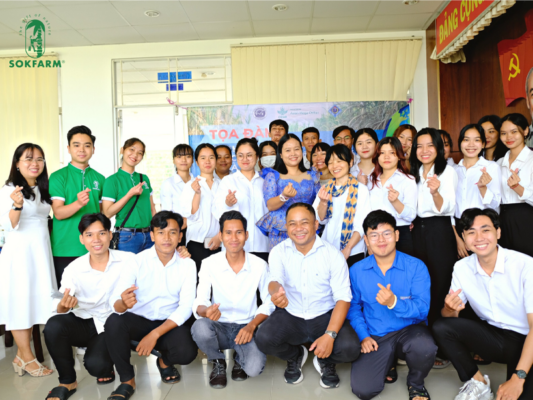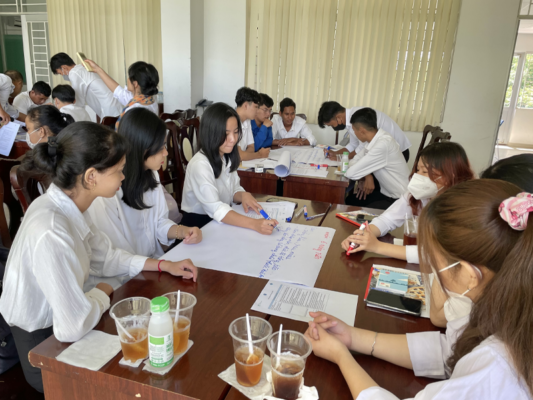 To provide a platform for co-learning and share ideas and opinions from the perspectives of gender, ethnicity, and age, the CGIAR Initiative on Asian Mega-Deltas (AMD), in collaboration with Can Tho University and Tra Vinh University, organized a workshop on gender and climate resilience and adaptation for Khmer youth in Tra Vinh, Vietnam.
To provide a platform for co-learning and share ideas and opinions from the perspectives of gender, ethnicity, and age, the CGIAR Initiative on Asian Mega-Deltas (AMD), in collaboration with Can Tho University and Tra Vinh University, organized a workshop on gender and climate resilience and adaptation for Khmer youth in Tra Vinh, Vietnam.
Attended by 30 young ethnic minority students from the Agriculture and Aquaculture School of Tra Vinh University, the workshop gave the students an opportunity to improve their awareness of the current sate of climate change in the Mekong Delta and in Tra Vinh province.
Dr. Nozomi Kawarazuka, scientist at the International Potato Center and gender focal point for AMD, facilitated a session on the global youth movement, agriculture and climate change and why gender matters in a changing climate. Dr. Kawarazuka gave a presentation on the current issues of agriculture and climate change, the importance of gender and diversity in the adaptation planning process, and the global youth movement to address those issues.
Dr. Kawarazuka stressed that the government, universities and private companies are developing various climate change adaptation strategies. However, she pointed out that most of the current strategies were “developed by rich people and for rich people,” as very poor farmers might not be able to afford the solutions, whereas the construction of wind turbines and hydropower can affect the lives and incomes of rural people.”
In his presentation, Dr. Ly Quoc Dang of the Mekong Delta Development Research Institute of Can Tho University, shared insights on how local people use their knowledge to cope with local changes. He stressed that, in the context of climate change, “local people use new knowledge in order to adapt to the current situation; it is their situated knowledge.”
Dr. Dang emphasized that women are more actively involved in environmental protection activities, and how they use knowledge of social roles, biological roles and everyday experiences to engage local authorities and manage the negative impacts of climate change on their lives, their families, and their communities. He then provided a research framework on the roles of women in the context of climate change through situated knowledge.
 To introduce the students to an innovation in agriculture, Ms. Thach Thi Chal Thi, co-founder of SokFarm, talked about her coconut nectar start-up business, which aims to raise income and improve the lives of coconut farmers in Tra Vinh while making healthy products available to consumers. Ms. Chal Thi explained that her company is using the traditional blossom massaging and nectar harvesting techniques of the Khmers in Tra Vinh to produce a variety of products from coconut nectar.
To introduce the students to an innovation in agriculture, Ms. Thach Thi Chal Thi, co-founder of SokFarm, talked about her coconut nectar start-up business, which aims to raise income and improve the lives of coconut farmers in Tra Vinh while making healthy products available to consumers. Ms. Chal Thi explained that her company is using the traditional blossom massaging and nectar harvesting techniques of the Khmers in Tra Vinh to produce a variety of products from coconut nectar.
Stressing that businesses need to maintain a harmony with the natural environment and the community, Ms. Chal Thi proudly shared that at Sokfarm, raw materials are grown, harvested, and processed under the principles of sustainability and environmental protection, to minimize anthropogenic impactson the environment.
As a culminating activity, a group excercise was conducted to encourage the participants to reflect, form, and exchange ideas on gender, diversity, and how to cope with climate change. The four workshop groups then did some brainstorming on the following ideas with a focus on innovation and sustainability: organic rice-crayfish farming systems, research and development of climate resistant crop varieties, producing compost from agri-aquacultural wastes, and a farming ecosystem of garden-pond-and-animal-pen.
AMD prioritizes co-production of knowledge and co-design of agricultural innovations based on varied needs and interests. In particular, the Initiative seeks to incorporate voices of young people, women farmers, and ethnic minorities.
Writen by Eisen Bernard, AMD communication consultant
